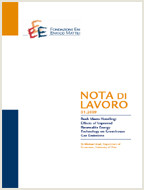The Circulation of Ideas in Firms and Markets

06.04.2010
Thomas Hellman, Enrico Perotti
D83, L22, M13, O31
Ideas, Innovation, Entrepreneurship, Firm Organization, Start-Ups
Economy and Society
Fausto Panunzi
Novel early stage ideas face uncertainty on the expertise needed to elaborate them, which creates a need to circulate them widely to find a match. Yet as information is not excludable, shared ideas may be stolen, reducing incentives to innovate. Still, in idea-rich environments inventors may share them without contractual protection. Idea density is enhanced by firms ensuring rewards to inventors, while their legal boundaries limit idea leakage. As firms limit idea circulation, the innovative environment involves a symbiotic interaction: firms incubate ideas and allow employees to leave if they cannot find an internal fit; markets allow for wide circulation of ideas until matched and completed; under certain circumstances ideas may be even developed in both firms and markets.
